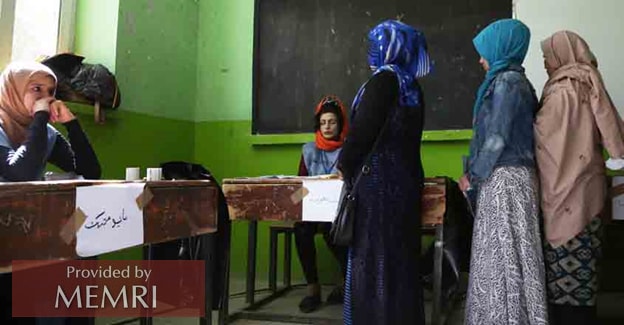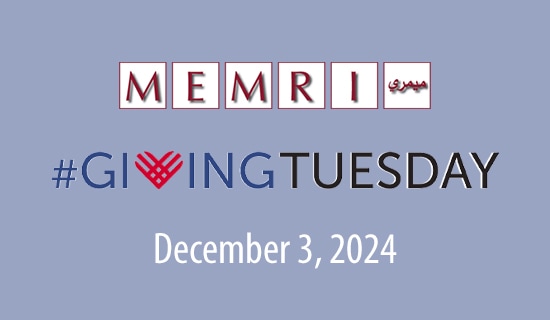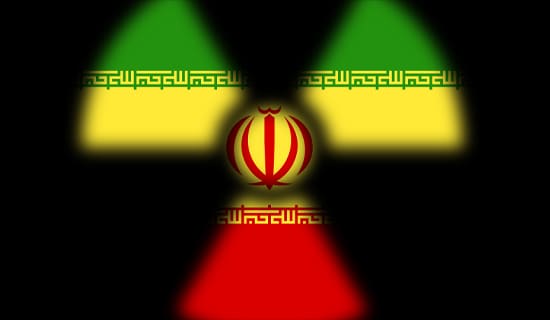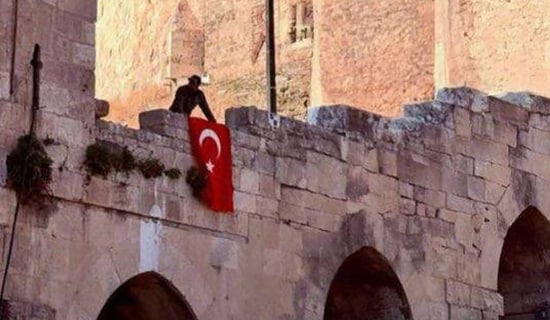In a recent article, Afghan writer Ejaz Ahmad Malikzada examined the implications for Afghanistan of the U.S.-Taliban agreement signed in Doha on February 29, 2020.[1] The Doha agreement, brokered with the help of Qatar and Pakistan, ensures the withdrawal of American and other foreign troops from Afghanistan, as well as the release of about 5,000 Taliban prisoners.

The fear is that the U.S.-Taliban deal could curtail Afghan women's liberties such as the right to vote.
The agreement, signed by U.S. envoy Zalmay Khalilzad and Mullah Abdul Ghani Baradar Akhund, the deputy emir for political affairs of the Islamic Emirate of Afghanistan (the Afghan Taliban organization, also paves the way for the Taliban to share power in an inclusive government following intra-Afghan talks, which are yet to begin.
In the article, titled "U.S. actions serve the Taliban's interests," Malikzada accused the U.S. of threatening the Afghan government with a reduction of $1 billion in aid, especially at this time when the Islamic Emirate (which ruled Afghanistan from 1996 to 2001) continues to fight the Afghan security forces in a bid to seize power in Kabul once the U.S. troops leave.
Following are excerpts from the article:
The Afghan Government "Is Fighting A Terrorist Group (Yes, The Taliban Are Still Terrorists... As Per The FBI Definition Of Terrorism)"
"As COVID-19 cases rise in Afghanistan, the Afghan government prepares itself for the day the virus hits hard. In the meantime, it is fighting a terrorist group (Yes, the Taliban are still terrorists, as per the FBI definition of terrorism), rushing to build an 'inclusive' cabinet to accommodate rivals who did not accept the 2019 election results, building an inclusive team of negotiators to do its bid at the negotiation table with the Taliban, and dealing with a decrease in funding from its main partner, the U.S., which is itself plunged into its own COVID-19 crisis.
"What is waiting for Afghanistan at the end of the line? Despite a handful of suggestions from our international friends on how to run the war and peace in Afghanistan, the U.S. is still going in the wrong direction. After months of shuttling between Kabul, Washington DC, Doha, and Islamabad, Ambassador Zalmay Khalilzad, the U.S. Department of State's Special Representative for the Afghanistan Peace Process, finally struck a deal with the Taliban [on February 29, 2020] in return for the Taliban promising not to allow any other terror groups to operate on Afghan soil, against American interests.
"The Taliban, in return, have been promised the release of 5,000 prisoners, to which the Afghan government dubiously agreed. The Taliban have secured international attention and recognition, as well as a boost of morale on the battlefield, and an op-ed in the New York Times [by Sirajuddin Haqqani, the head of the Taliban's Haqqani Network]. Let me repeat: the New York Times gave free exposure[2] to a man with an FBI bounty on his head,[3] the brother of the leader of the Haqqani terror network who has the blood of thousands of innocent Afghans on his hands. But we all know Haqqani did not write it, did he?

The New York Times ran an oped by Sirajuddin Haqqani on February 20, 2020.
"The Taliban took 18 months to set up a diplomatic stage for themselves, paid for by Qatar and diplomacy trainings provided by Pakistan. The period of negotiation and back-and-forth diplomacy by Khalilzad, despite Taliban offensives against American targets, helped the terrorist group to whitewash five years of a medieval regime and 19 years of violence against Afghans. The deal was signed after a stipulated one-week period of a 'Reduction in Violence,' during which the Taliban attempted to show unity of command. Despite efforts by Taliban leaders in Qatar, there were some Taliban offensives against Afghan security forces. The offensives were responded to by the Afghan government and the U.S. forces."
"The 'Peace Deal' Signed With The U.S. Is Supposed To Kick-start An End To The War"; "However, We Are Witnessing Continued Taliban Offensives That Cost Civilian Lives"
"The 'peace deal' signed with the U.S. is supposed to kick-start an end to the war in Afghanistan. However, we are witnessing continued Taliban offensives that cost civilian lives as well as lives of the ANDSF [Afghan National Defence and Security Forces]. A Taliban insider attack on an Afghan army base killed 25 members of the Afghan police and army in Zabul. Another attack on a Sikh gurdwara (temple) in the Afghan capital on March 25, which killed 25 Afghan Hindu and Sikh civilians, was claimed by Islamic State's Khorasan Province. However, an Afghan Government source claimed that 'the attack was the work of the Haqqani network.' This is a clear sign that the Taliban continue their terror operations in order to gain an upper hand in the 'peace talks.'
"The success of the U.S. talks with the Taliban was unforeseen by the Afghan government, given that the Taliban only wanted a complete withdrawal of the 'foreign forces from Afghanistan.' Thanks to Ambassador Khalilzad's diplomacy and experience of making deals with the terrorist group, a withdrawal of U.S. forces now looks imminent. The Taliban extended the talks and the agreement with the U.S. as every meeting was a triumph and the Taliban received a blank check to write their demands. Hence, the prolonged U.S.-Taliban talks undermined the Afghan elections. The talks of an interim setup instead of the planned September 2019 elections cultivated uncertainty among the election campaigns.
"After months of electioneering, results were announced in favor of President Ashraf Ghani, who received more than 50 percent of votes, with [Dr. Abdullah] Abdullah earning 39.5 percent, and the Afghan government was challenged by a number of politicians who warned that the country would slide into civil war if Abdullah does not secure more than 50 percent of power. The international community, including the U.S., stood with President Ghani, leaving Abdullah supported only by Iran and Russia.
"President Ghani failed to bring his arch-rival, Dr. Abdullah, and Abdullah's allies – mainly former mujahideen and former government officials – to accept the election results. After U.S. Secretary Mike Pompeo failed to bring the two together, he went home and slapped the U.S.'s Afghan partner with a statement that he would cut $1 billion in aid, adding a few other verses to the Taliban's celebratory poems and songs of 'victory against infidel foreign occupiers and their puppet government.' Since the initial talks with the U.S. representative, the Taliban have boasted about the U.S. 'withdrawal talks' as a triumph against the wealthiest superpower of the world, with the most advanced military that hunted them in Tora Bora and shook them with the 'Mother of all Bombs.'"

U.S. envoy Zalmay Khalilzad and the Taliban's Mullah Baradar exchange documents in Doha.
The Taliban "Are Trying To Buy More Time Until The U.S. Withdraws From The Country And So They Can Impose Their 'Islamic Emirate' On Afghans"
"The Afghan government has established a 21-member negotiating team [for intra-Afghan talks involving the Taliban]. The negotiating team almost covers all walks of life, including victims of conflict, youth (who comprise more than 65 percent of the Afghan population), academia, clergy, technocrats and former mujahideen, political parties, ethnics groups and, most importantly, women, to face the all-male Taliban negotiating team.
"The negotiating team received a substantial amount of support from all parties on the republic side, including Dr. Abdullah. Dr. Abdullah's support for the negotiating team is a sign that he is on the same team with President Ghani to march in peace negotiations against the Taliban.
"The Taliban, however, have shown opposition to the Afghan 21-member negotiating team of the Afghan government. As always, the Taliban come up with excuses to delay talks with the Afghan government. They are trying to buy more time until the U.S. withdraws from the country and so they can impose their 'Islamic Emirate' on Afghans, as they are still pursuing military campaigns against the Afghan government.
"Top Taliban leaders still preach the same sentiments – re-establishing their 'Islamic Emirate' – to their ranks and followers. In a March 25 speech to supporters in the southwestern Pakistani province of Baluchistan, Mullah Fazel, a former top Taliban military commander and senior member of the Taliban negotiating team in Doha, said, they will establish an 'Islamic Emirate,' 'and there will be a system based on Shari'a (Islamic law).'
"The Taliban have made peace with the Americans but their killing spree against Afghans continues. The agreement with the U.S. will not result in a divorce, however, with Al-Qaeda, Taliban's ideological brothers. It will only strengthen the Taliban's resolve to take over Afghanistan and once again turn it into a launchpad of jihad against the West."
"I Would Like To Also Remind The World That Pakistan Is Harboring Terror; The Pakistani Problem Of The War In Afghanistan Has Not Been Resolved"
"Call me a preacher of gloom, doom and war, but, like every other Afghan, I am tired of this war. I have lived in Kabul through its thick and thin since I can remember, and I have seen worse days one can imagine, and so peace is a dream. But as the famous Afghan expression says, 'this way only goes to Turkistan,' a sudden U.S. withdrawal will bring its foot back to Afghanistan. The Taliban 'counter-terrorism' assurances, and a number of CIA operatives [remaining in Afghanistan], will not suffice against the proxies of Pakistan and Iran.
"I would like to also remind the world that Pakistan is harboring terror. The Pakistani problem of the war in Afghanistan has not been resolved even after months of Ambassador Khalilzad's bickering in Pakistan. Pakistan still provides safe havens to the Taliban. The Pakistani establishment provides funding to madrassas that train terrorists for suicide bombings.
"Now that the U.S. has signed an agreement to withdraw forces – but to leave a number of intelligence forces to confront any other jihadist activity against the U.S. and its interests – it must also honor its strategic Bilateral Security Agreement with the Afghan government. The U.S. must leave a number of forces in the country as a guarantee to avoid a Taliban march to take over the capital. A Taliban takeover of the capital will mean a bloody battle and a massacre of all those civilians the Taliban have listed – of those women and men who have stood and fought against the Taliban ideology.
"Any agreement with the Taliban must not undermine the Afghan Constitution and the hard-earned achievements of the past nineteen years. The implementation of any agreement must be strictly watched over by international military and economic guarantors. The Taliban have a history of breaking promises and agreements."
"Continued Training And Funding To The ANDSF [Afghan National Defence And Security Forces] Is Crucial To Deter The Taliban From Taking Over The Country"
"After the Bonn Agreement, which was the preliminary series of agreements to re-create the state of Afghanistan following Operation Enduring Freedom in response to the September 11, 2001 terrorist attack in New York, Afghanistan has made significant progress in democratizing itself. The adaptation of an enlightened Constitution in 2004, holding presidential and parliamentary elections (despite technical problems and disputes over election results in the 2014 and 2019 presidential elections) are all the results of a state developing towards prosperity.
"Afghanistan has excelled itself by building a national economy from ground zero; it has constructed a national army and national police force, grown and improved a formal education system, and recovered the status and future of Afghan women. A strong commitment from the international community and the U.S. is crucial in supporting the Afghan institutions.
"The international community must stand with and support the Afghan National Defence and Security Forces, as the existence of ANDSF ensures the sovereignty of Afghanistan as well as a strong block against the establishment and existence of terrorist groups in the country.
"Continued training and funding to the ANDSF is crucial to deter the Taliban from taking over the country in yet another bloody war that will cost thousands of lives and billions of dollars. I can also say that the people of Afghanistan will not just watch and welcome the Taliban takeover of the country. The Afghan youth have resisted a Taliban medieval ideology, as have the Afghan women, and it is a very clear indicator that the dark times of the Taliban will not be accepted and welcomed anymore by the new generation of Afghanistan."
[1] ToloNews.com (Afghanistan), April 7, 2020. The original English of the article has been lightly edited for clarity and standardization.
[2] Nytimes.com/2020/02/20/opinion/taliban-afghanistan-war-haqqani.html, February 20, 2020.
[3] Fbi.gov/wanted/terrorinfo/sirajuddin-haqqani, accessed April 8, 2020.





